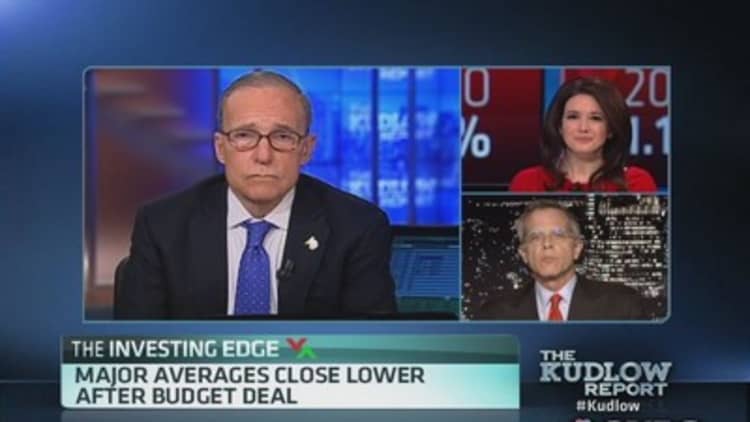U.S. Treasurys
Treasurys prices fell on Thursday as traders reduced their bond holdings in reaction to stronger-than-expected retail sales data that signaled fourth-quarter domestic growth might not be as weak as some had originally thought.
The Treasury auctioned $13 billion in 30-year bonds at a high yield of 3.900 percent. The bid-to-cover ratio, an indicator of demand, was 2.35.
The 30-year bond last traded 9/32 lower with a yield of 3.904 percent. Benchmark 10-year Treasury notes traded 7/32 lower to a yield of 2.886 percent.
This bond auction followed a poor $21 billion 10-year note sale on Wednesday and a solid $30 billion three-year note auction on Tuesday.
The supply wave will continue next week when the U.S. Treasury will sell $32 billion in two-year notes, $35 billion in five-year debt, $29 billion in seven-year notes and $16 billion in five-year Treasury Inflation-Protected Securities.

The stronger-than-expected 0.7 percent rise in consumer spending in stores and gas stations last month also stoked speculation whether the Federal Reserve might decide it will trim its $85 billion of monthly purchases of Treasuries and mortgage-backed securities at its policy meeting next Tuesday and Wednesday.
Thirty-two economists expect the Fed to taper its third round of quantitative easing or QE3 in March, while 22 said it would scale back its bond-buying program in January, according to a Reuters poll released on Wednesday. Only 12 economists expected a tapering announcement next week.
"It puts in question the belief about the tapering early next year. It also raises the possibility a rate hike might happen sooner rather than later,'' said Thomas Roth, executive director of U.S. government bond trading at Mitsubishi UFJ Securities in New York.
However, the relatively upbeat retail sales figures were countered by a jump in weekly jobless claims that raised some doubt whether the recent pickup in job growth is sustainable.
Some economists downplayed the increase—the biggest weekly rise in filings for unemployment benefits in 13 months—due to seasonal distortions from the Thanksgiving holiday in late November.
"It was heavily distorted by the holiday. You had a low-ball number last week and a high one this week. You have to take the two weeks together,'' said Jacob Oubina, senior economist with RBC Securities in New York.
—By Reuters

